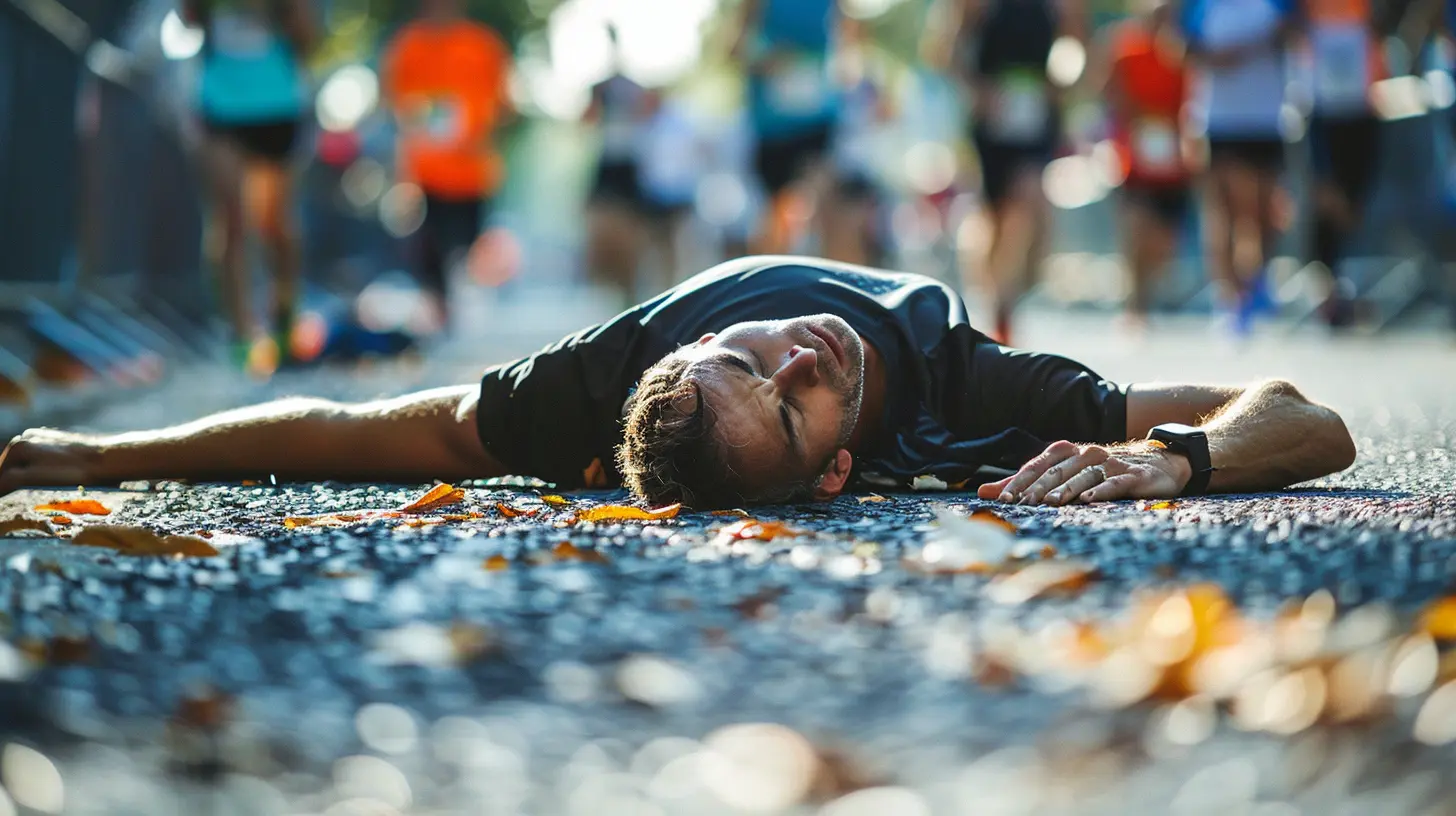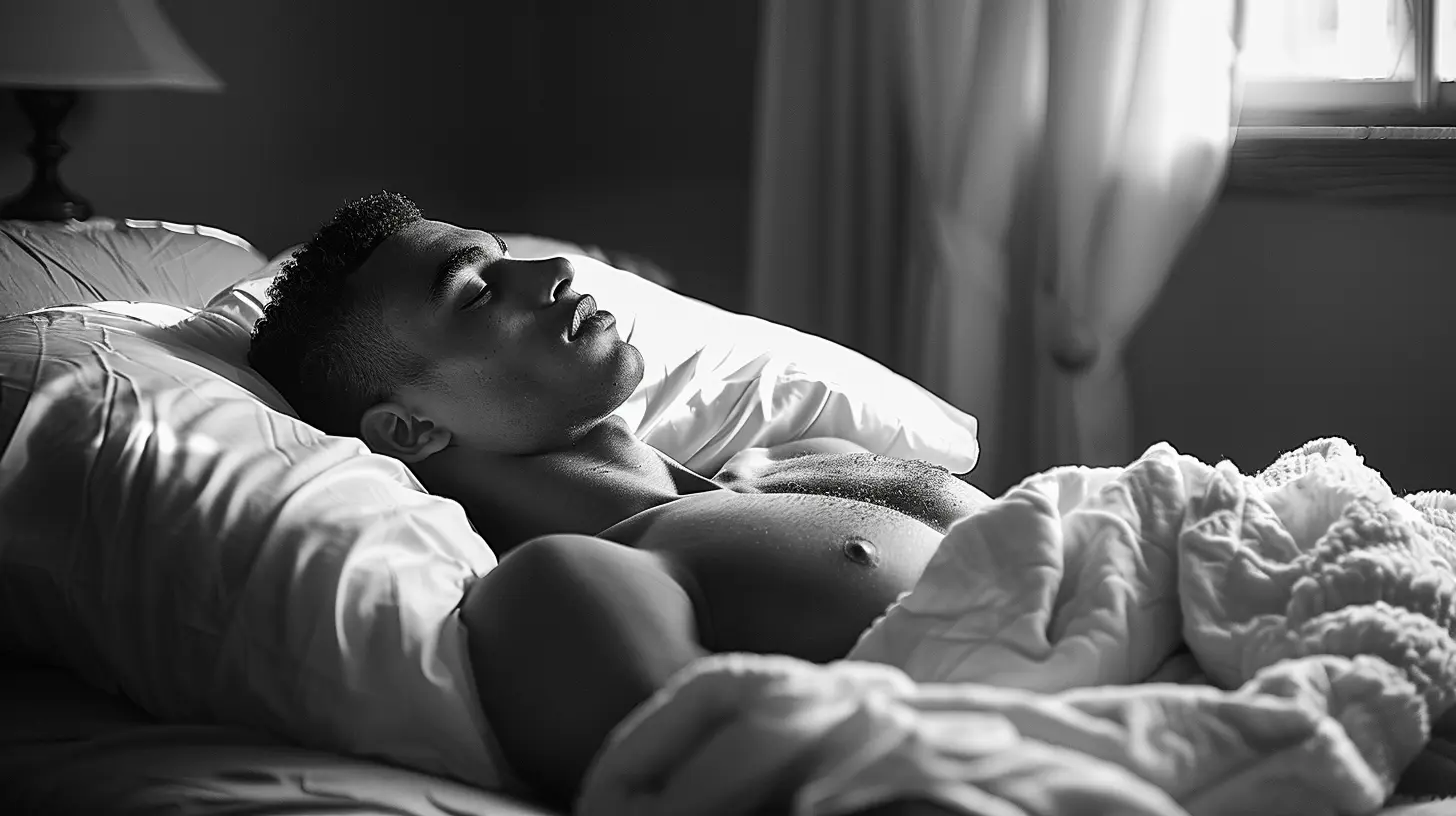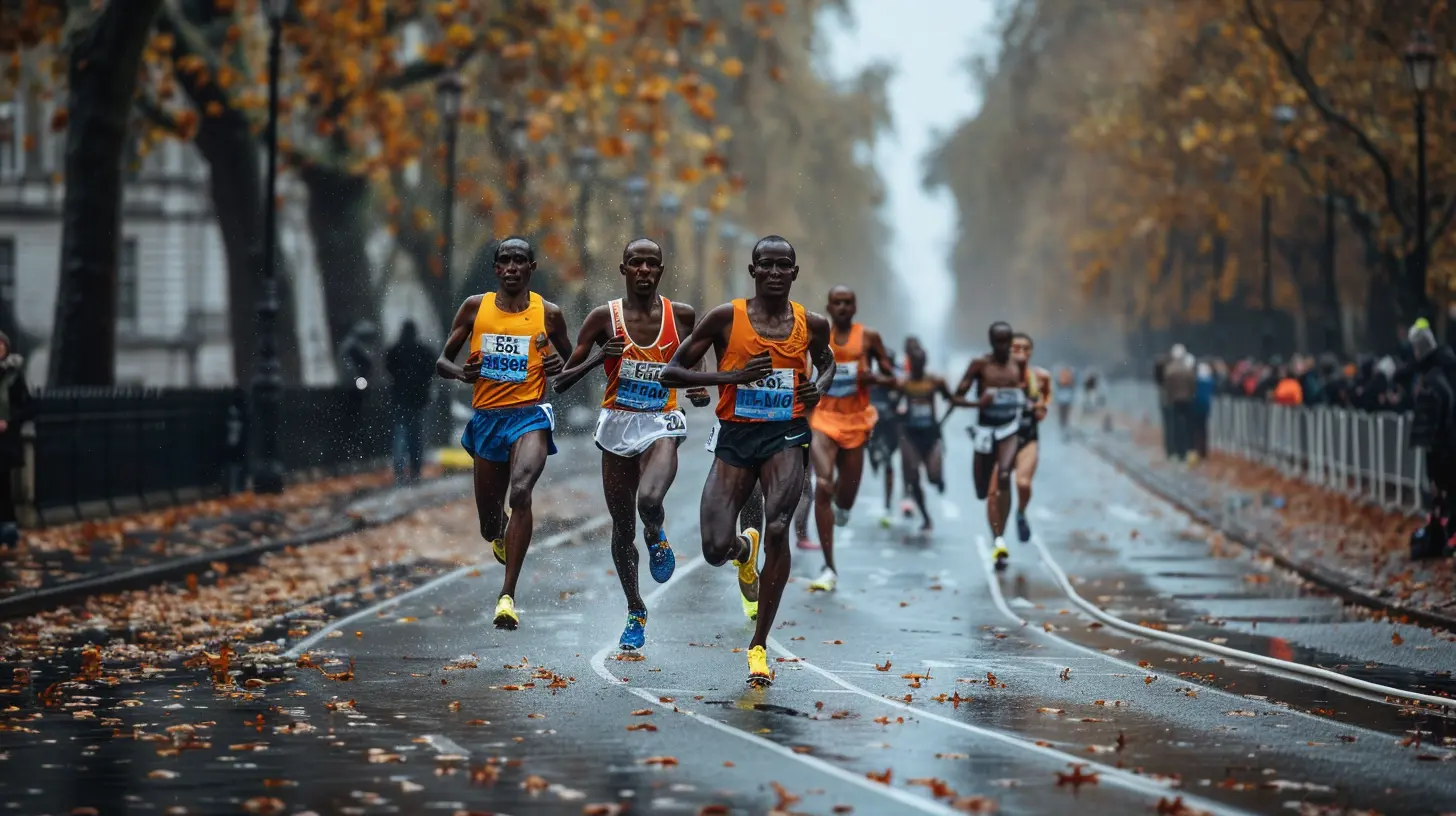The Role of Sleep in Marathon Training and Recovery
9 January 2025
Running a marathon is no joke. It takes months of preparation, mental toughness, and physical endurance. But while most of us obsess over training schedules, nutrition plans, and shoe choices, there's one essential factor that often gets overlooked: sleep. Yep, good old-fashioned sleep.
You might think that logging those miles and eating the right foods are the key ingredients for success, but without proper sleep, even the best training plan can fall flat. Let's dive deep into why sleep is such a game-changer when it comes to marathon training and recovery.

Why Sleep Matters for Marathon Runners
We all know sleep is important for general health. But when it comes to marathon training, its role becomes even more crucial. Think of sleep as the body's natural repair shop. After a long, strenuous workout, your body needs time to recover, rebuild muscles, and consolidate the gains you’ve made that day. And guess what? Most of that magic happens while you’re catching Z’s.Physical Recovery
When you sleep, your body produces growth hormones, which are essential for muscle repair and rebuilding. Those long runs and interval sessions tear down muscle fibers, and it's during deep sleep that your body works to repair and strengthen those fibers. It's like going to the gym and lifting weights—you break down the muscle, and then during recovery (aka sleep), it grows back stronger.Without enough sleep, your muscles don’t get the recovery they need, leaving you sore, fatigued, and at a higher risk of injury. Imagine trying to build a house but never letting the cement dry between laying the bricks. Eventually, the foundation will crumble. That’s what happens to your body when you neglect sleep during marathon training.
Mental Recovery
Marathon training isn’t just about physical endurance; it's also a mental game. Sleep plays an essential role in cognitive function, memory consolidation, and emotional regulation. During REM sleep (the dream phase), your brain processes the information you’ve taken in throughout the day—everything from running techniques to race strategies.Think of sleep as your brain's filing system. Without enough sleep, those mental files don't get sorted properly, making it harder to focus, make decisions, or stay motivated. Ever felt foggy or irritable after a bad night’s sleep? Yeah, that's your brain struggling to keep up. And in a marathon, where mental clarity and emotional control are just as important as physical endurance, skimping on sleep can be a recipe for disaster.

How Much Sleep Do Marathon Runners Need?
Alright, so we’ve established that sleep is essential, but how much of it do you actually need? Well, the answer isn’t one-size-fits-all, but most experts recommend aiming for 7 to 9 hours of sleep per night. If you're deep into marathon training, you might need even more to keep your body and mind functioning optimally.Just like you wouldn’t expect to run a marathon on 4 hours of training a week, you also can't expect peak performance on 4 hours of sleep a night. The more intense your training, the more sleep your body needs to recover. During particularly grueling training weeks, you might even need up to 10 hours of sleep to fully recharge.
Quality vs. Quantity
It’s not just about how much sleep you get but also about the quality of that sleep. If you’re tossing and turning all night, waking up frequently, or not spending enough time in deep sleep, your body won’t get the full benefits of rest, no matter how many hours you clock.Consider focusing on creating a sleep environment that promotes quality rest. This means keeping your bedroom cool, dark, and quiet. Avoid screens and bright lights right before bed, as they can disrupt your body's natural sleep-wake cycle.

Sleep’s Role in Injury Prevention
One of the most significant risks for marathon runners is injury. Whether it’s shin splints, runner’s knee, or a dreaded stress fracture, injuries can derail all your hard work. And here’s the thing: sleep plays a massive role in keeping those injuries at bay.When you sleep, your body undergoes tissue repair and produces cytokines—proteins that help fight inflammation and infection. Lack of sleep can lead to increased inflammation, slower recovery times, and a higher likelihood of injury. It’s like skipping oil changes for your car—eventually, things are going to break down.
In fact, studies have shown that athletes who get less than 6 hours of sleep a night are at a significantly higher risk of injury compared to those who get at least 8 hours. So, if you want to stay injury-free and keep logging those miles, making sleep a priority is non-negotiable.

The Impact of Sleep Deprivation on Performance
We’ve all had those days when we feel sluggish and out of sorts after a bad night's sleep. Now imagine trying to run 26.2 miles in that state. Yikes.Reduced Endurance
Sleep deprivation directly impacts your endurance. Research has shown that athletes who are sleep-deprived tend to have shorter time to exhaustion, meaning they tire out more quickly. Your muscles fatigue faster, your reaction time slows down, and your perceived effort increases. In simple terms, running feels way harder than it should.Even a single night of poor sleep can negatively impact your performance, but chronic sleep deprivation is where things get really dicey. If you’re consistently skimping on sleep during training, you're not just limiting your day-to-day performance—you’re also capping your overall potential come race day.
Impaired Recovery
We’ve already touched on this, but it’s worth repeating. Without adequate sleep, your body doesn't recover properly between runs. This means you’re starting each training session at less than 100%, which can lead to a vicious cycle of decreased performance and increased risk of injury.Think of it like trying to run a marathon with a half-charged phone battery. Sure, it might last for a while, but eventually, it’s going to die out—and probably sooner than you’d like.
Mental Fatigue
Running a marathon is as much a mental challenge as it is a physical one. Sleep deprivation impacts cognitive function, focus, and emotional regulation—all key components of running a successful marathon. When you’re sleep-deprived, even the smallest obstacles can feel monumental, and staying motivated becomes an uphill battle.On race day, you want to be sharp, calm, and focused. Being tired and foggy is not the mental state you want when you hit the infamous "wall" at mile 20.
Tips for Improving Sleep During Marathon Training
Alright, so now that we’ve established the importance of sleep, how can you make sure you’re getting enough of it? Here are some practical tips to improve both the quantity and quality of your sleep during marathon training:1. Stick to a Sleep Schedule
Try to go to bed and wake up at the same time every day, even on weekends. This helps regulate your body’s internal clock and makes it easier to fall asleep and wake up feeling refreshed.2. Create a Pre-Bedtime Routine
Just like you have a warm-up routine before runs, having a consistent pre-bedtime routine can signal to your body that it’s time to wind down. This could include activities like reading, stretching, or doing some light meditation. The key is to keep it relaxing and avoid anything too stimulating (like scrolling through Instagram).3. Limit Caffeine and Alcohol
Both caffeine and alcohol can interfere with your sleep quality. Try to cut off caffeine intake by early afternoon, and limit alcohol consumption, especially in the evenings. While alcohol might make you feel sleepy initially, it can disrupt your sleep later in the night.4. Optimize Your Sleep Environment
Make sure your bedroom is conducive to sleep. Keep it cool (between 60-67°F), dark, and quiet. Consider using blackout curtains or a sleep mask, and if noise is an issue, try using earplugs or a white noise machine.5. Manage Stress
Marathon training can be stressful, and stress is a common cause of sleep disturbances. Incorporating stress-management techniques like yoga, mindfulness, or deep breathing exercises can help you relax and improve your sleep quality.6. Nap Smartly
If you’re feeling particularly wiped out during intense training periods, taking a short nap (20-30 minutes) can be beneficial. Just avoid napping too late in the day, as it can interfere with your nighttime sleep.
Conclusion
In the world of marathon training, sleep isn’t just an afterthought—it’s a critical component. It’s the invisible force that helps you recover, prevents injuries, and ensures you’re ready to tackle the next training session with full strength. So, while it might be tempting to squeeze in one more mile or another Netflix episode before bed, remember that prioritizing sleep could be the key to achieving your marathon goals.Next time you’re putting together your training schedule, make sure sleep is at the top of the list. Your body (and your race day performance) will thank you.
all images in this post were generated using AI tools
Category:
MarathonAuthor:

Uziel Franco
Discussion
rate this article
17 comments
Raelyn Vasquez
Who knew snoozing could be a secret weapon in marathon training? While runners clock those miles, it seems catching Z's is just as crucial! Remember, folks, the couch may not be your enemy; it could be your best training partner. Sleep well, run well, and dream of finish lines!
March 26, 2025 at 9:55 PM

Uziel Franco
Absolutely! Sleep is essential for recovery and performance. Embracing rest can enhance training outcomes and overall marathon success. Happy running!
Katherine Kelly
Great article! Sleep is crucial for marathon training and recovery. Prioritizing quality rest not only enhances performance but also prevents injuries. Thanks for highlighting its significance in an athlete's routine!
February 6, 2025 at 7:50 PM

Uziel Franco
Thank you for your thoughtful comment! I'm glad you found the article helpful—quality sleep truly is essential for optimal performance and recovery in marathon training.
Wynter McQuillan
Great insights on the importance of sleep in marathon training! It’s fascinating how rest can significantly enhance performance and recovery. Thank you for sharing such valuable information!
February 1, 2025 at 11:27 AM

Uziel Franco
Thank you for your encouraging feedback! I'm glad you found the insights on sleep's role in performance and recovery helpful. Happy training!
Pamela Duke
Essential for peak performance!
January 26, 2025 at 7:48 PM

Uziel Franco
Absolutely! Sleep is vital for recovery and maximizing performance during training.
Emmett McCarthy
Sleep is crucial for marathon training—it's when your body repairs and builds endurance. Prioritize it!
January 20, 2025 at 8:52 PM

Uziel Franco
Absolutely! Sleep is indeed vital for recovery and performance in marathon training. Prioritizing rest can significantly enhance endurance and overall training effectiveness.
London Wells
Great insights! Sleep truly impacts athletic performance.
January 16, 2025 at 5:19 AM

Uziel Franco
Thank you! Absolutely, sleep is crucial for optimizing performance and recovery in marathon training.
Zina Murphy
Great insights! Sleep truly is essential for peak marathon performance.
January 15, 2025 at 12:49 PM

Uziel Franco
Thank you! I'm glad you found the insights helpful—sleep is indeed a game-changer for marathon training and recovery!
Zevros Watson
Sleep is the unsung hero of marathon training! You can log all the miles you want, but if you're skimping on shut-eye, you're just running in circles. Forget the coffee; prioritize that beauty rest! Remember, even champions need their beauty sleep to crush the competition. 💤🏃♂️💥
January 15, 2025 at 3:50 AM

Uziel Franco
Absolutely! Sleep is crucial for recovery and performance, ensuring your body repairs itself and prepares for the next run. Prioritizing rest can significantly enhance your training outcomes. 💤🏃♂️
Drift Moses
Great article! It's so important to highlight the vital role sleep plays in marathon training and recovery. Prioritizing rest not only enhances performance but also aids in injury prevention. Thanks for shedding light on this often-overlooked aspect—sleep truly is a game-changer for every runner! Keep up the awesome content!
January 14, 2025 at 8:42 PM

Uziel Franco
Thank you so much for your kind words! I'm glad you found the article helpful—sleep really is essential for optimal performance and recovery. Happy running!
Ardyn Wheeler
Who knew that the secret weapon for marathon training wasn’t just carbs and long runs, but a cozy blanket and a good night’s snooze? Looks like my couch is now a training partner! Marathon dreams fueled by naps—who’s in? 💤🏃♂️
January 14, 2025 at 11:55 AM

Uziel Franco
Absolutely! Sleep is crucial for recovery and performance. Embracing rest as part of your training can make a significant difference. Happy napping! 💤🏃♂️
Zaid McGovern
Great insights! Sleep truly is essential for performance.
January 13, 2025 at 7:39 PM

Uziel Franco
Thank you! I'm glad you found the insights valuable. Sleep is indeed crucial for optimal training and recovery.
Blake Wyatt
This article beautifully highlights the crucial link between sleep and marathon performance. Prioritizing restorative sleep not only enhances physical recovery but also sharpens mental focus, ultimately leading to better training outcomes and race results. Great read!
January 13, 2025 at 3:30 AM

Uziel Franco
Thank you for your insightful comment! I'm glad you found the connection between sleep and marathon performance valuable. Prioritizing rest truly makes a difference!
Patricia Riggs
Sleep: the secret sauce for speedy marathon dreams!
January 12, 2025 at 1:01 PM

Uziel Franco
Absolutely! Sleep is essential for recovery, enhancing performance, and achieving those marathon goals. Prioritize it for your best results!
Zayden Rodriguez
Sleep is the unsung hero of marathon training; it aids muscle recovery, enhances mental focus, and boosts overall performance. Prioritizing quality rest can be a game-changer for any athlete.
January 12, 2025 at 5:39 AM

Uziel Franco
Absolutely! Quality sleep is essential for recovery and performance, making it a vital component of any successful marathon training regimen.
Lexi Carr
Sleep is the unsung hero of marathon training! Embrace those cozy nights and naps; they’ll boost your performance and recovery. Dream big and run even bigger! 💤🏃♂️💨
January 11, 2025 at 5:24 AM

Uziel Franco
Absolutely! Sleep is essential for recovery and optimal performance in marathon training. Embrace it to elevate your running game! 💤🏃♂️
London Barker
Great article! It's amazing how crucial sleep is in maximizing performance and recovery for marathon training. As a runner, I often overlook this aspect, but your insights have inspired me to prioritize my rest more. Thank you for shedding light on such an important yet often underestimated component of training!
January 10, 2025 at 2:04 PM

Uziel Franco
Thank you for your kind words! I'm glad you found the insights helpful—prioritizing sleep can make a big difference in your training and recovery. Happy running!
Viviana McInerney
Sleep is truly the unsung hero in marathon training. It’s amazing how much recovery and performance hinge on those precious hours of rest. Thank you for shedding light on such an essential aspect of our training journeys!
January 9, 2025 at 9:04 PM

Uziel Franco
Thank you for your insight! Sleep is indeed vital for recovery and performance—it's the foundation of effective training. Happy running!
MORE POSTS

The Cultural Influence of the All-Star Game in Mainstream Media

How to Optimize Your Breathing for Endurance Sports

Rugby Legends: Players Who Changed the Game Forever

How to Build Confidence for Competitive Racing

The Growing Role of Sustainability in Sports Sponsorship Agreements

How to Stay Calm Under Pressure in High-Stakes Esports Matches
![Beyond the Stats: The Leadership of [Player Name] On and Off the Field](/pictures/blog/small/beyond-the-stats-the-leadership-of-player-name-on-and-off-the-field_2.webp)
Beyond the Stats: The Leadership of [Player Name] On and Off the Field

Building Aerobic Capacity: The Key to Long-Distance Success

Defensive Streamers: Weekly Winners in Fantasy Football

The Importance of Hydration for Young Athletes

How Cycling Can Improve Your Running Endurance